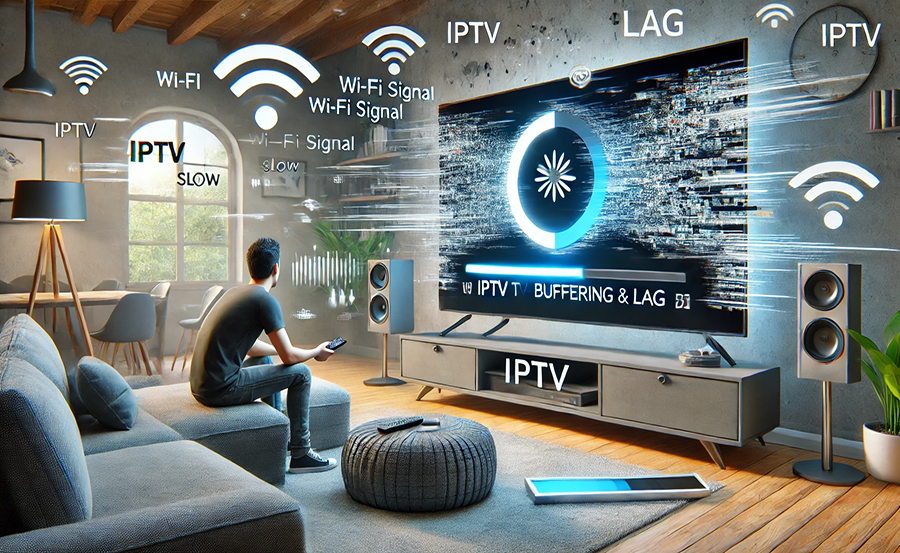In today’s fast-paced digital world, having a reliable Internet connection is essential for enjoying IPTV services. Whether it’s binge-watching your favorite series or surfing through live TV, a seamless experience is key. Unfortunately, numerous users face common hiccups with their Wi-Fi network, directly impacting their IPTV experience. This guide aims to explore these obstacles and provide effective solutions, ensuring a smooth and enjoyable viewing journey. Buy 1 Year IPTV and Enjoy Unlimited Content
Understanding IPTV: A Brief Overview
IPTV, or Internet Protocol Television, revolutionizes the way content is consumed, taking broadcasting to a new level of fun. Unlike traditional cable or satellite connection, IPTV relies on an Internet connection to deliver content, offering a more flexible and customizable viewing experience. But, as with any device tied to the Internet, the quality of the connection can make or break the service.
When enjoying IPTV on a Smart TV, it’s crucial to grasp how the system works. Understanding the flow of data can help identify where issues might arise – whether it’s compatibility problems or network instability.
Basics of IPTV
- IPTV relies on a stable Internet connection.
- Content is delivered via IP networks instead of cables or satellites.
- Requires compatible devices for optimal performance.
Device Compatibility: A Common Roadblock
Not all devices are created equal, and this is especially true when it comes to IPTV compatibility. Some smart TVs and streaming devices handle IPTV content seamlessly, while others cause frequent glitches.
So, what areas should users be aware of? Device specs and firmware updates play a crucial role. Ensuring your hardware matches or exceeds software requirements can avoid unnecessary headaches.
Wi-Fi Configuration and Optimization
A sound Wi-Fi setup is the backbone of a solid IPTV experience. However, several factors can influence this setup, leading to buffering, service drops, and picture quality issues. Let’s delve into these aspects and explore how users can tackle them.
Router Placement and Signal Strength
Who knew that the positioning of a router could impact IPTV performance? Too many users overlook this simple yet powerful factor. Ideally, your router should be centrally located to provide an even distribution of signal strength throughout the house.
- Place the router in an open, central area of your home.
- Avoid physical obstructions like walls or large furniture.
- Keep the router away from electronic devices that cause interference.
Wi-Fi Channel Selection
Choosing the right Wi-Fi channel might seem trivial, but it significantly impacts IPTV quality. By default, routers often select crowded channels leading to network congestion. Switching to a less crowded channel can improve connection stability.
Steps to Change Wi-Fi Channel
1. Access your router’s settings via the web interface.
2. Look for the ‘Wireless Settings’ or ‘Advanced Wireless Settings’ section.
3. Choose a less crowded channel by visualizing channel overlaps using a Wi-Fi analyzer tool.
Troubleshooting Common IPTV Issues
Stepping into the world of IPTV brings with it a mix of excitement and unanticipated issues. The good news is most of these complications have straightforward fixes, allowing users to return to the comfort of their couch viewing their desired content.
Buffering: The Unwanted Interruption
Few things are more frustrating than unexpected buffering during a gripping scene. Buffering occurs when the video stream can’t download data fast enough. Users can often resolve these problems by tweaking a few settings or improving their Wi-Fi configuration.
Consider these approaches:
- Pause the video for a few moments to allow the stream to catch up.
- Reduce streaming quality to match internet capabilities.
- Limit the number of devices connected to the network simultaneously.
IPTV on Smart TV: Not Working?
Several issues might cause IPTV not to work on a Smart TV. This could include incompatible apps or outdated software versions. Regularly checking for updates and ensuring app compatibility can bring new light to your viewing experience.
IPTV Advanced Tips for Better Enjoyment
Once the common obstacles are cleared, enhancing your IPTV enjoyment takes center stage. It’s worth considering additional approaches to solidify and elevate your streaming adventures.
Using Wired Connections
Though wireless connections are convenient, a wired connection offers a stable and consistent experience. Ethernet cables provide a direct link between the router and the device, reducing latency and packet loss.
Leveraging VPNs
VPNs can offer privacy and improve performance by avoiding throttling from ISPs. Choose a reputable service that promises speed and reliability for an enjoyable, secure experience.
Strategic VPN settings:
- Select a server geographically closer to your location to minimize latency.
- Use a VPN with robust infrastructure to maintain high-speed connections.
A Fresh Take on Streaming Challenges
Sitting down for a movie or live TV session should be about enjoyment, not frustration. With a little effort and these troubleshooting steps, buffering and connectivity issues can become a thing of the past. Remember, knowledge is power, and with a good understanding of your network’s strengths and weaknesses, you can fully immerse yourself in the world of IPTV.
Frequently Asked Questions (FAQ)

Why is my IPTV Service Buffering?
Buffering often results from insufficient Internet speed, network congestion, or inadequate streaming settings. Check your Internet speed, adjust streaming quality, and try wired connections where possible.
How Can I Improve IPTV Quality on Smart TV?
To enhance quality, ensure your Smart TV software is up to date, limit the number of network-connected devices, and explore wired Ethernet connections for stable streaming.
Are VPNs Beneficial for IPTV Streaming?
Yes, VPNs can improve privacy and bypass throttling. Opt for a high-speed, reputable VPN service and select servers nearest your location to optimize performance.
Which Devices are Best for IPTV?
Devices such as high-definition Smart TVs, capable streaming sticks, or media boxes known for optimum performance support seamless IPTV experiences.
What Should I Do if IPTV is Incompatible with My Device?
If your device faces compatibility issues, consider upgrading to newer models. Alternatively, use an external streaming device compatible with your IPTV service.
How Often Should I Update My IPTV Application?
Regular updates ensure you enjoy the latest features and improved security. Enable automatic updates where possible, or check manually each month.
Lazy IPTV: Your Step-by-Step Setup and Troubleshooting Guide





